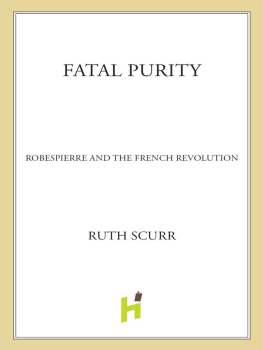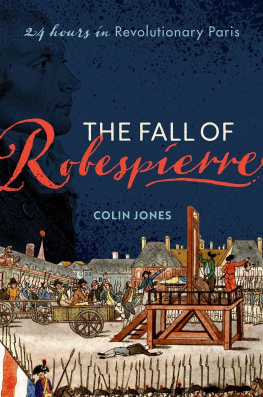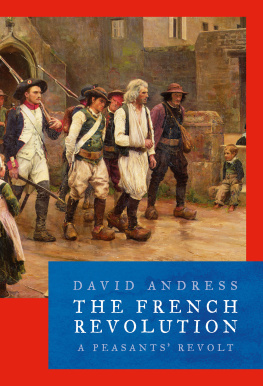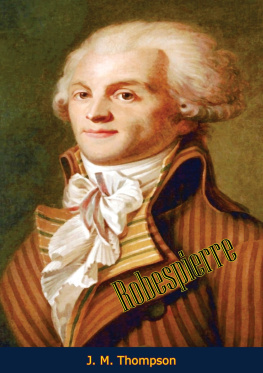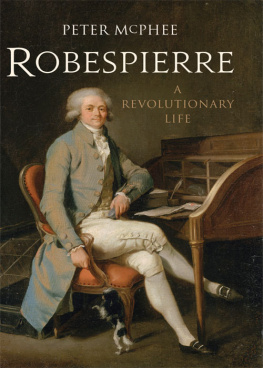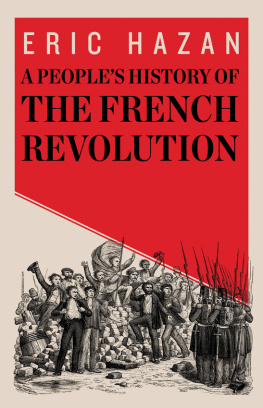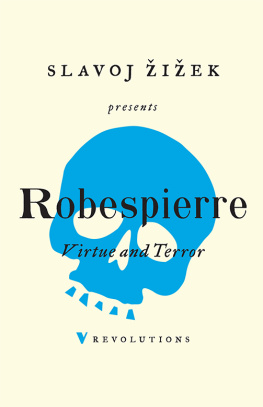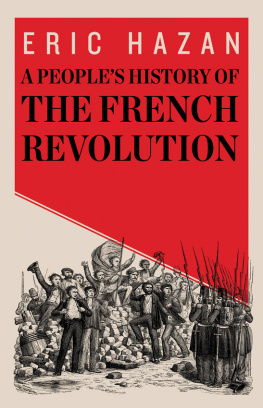1758 | Maximilien Marie Isidore de Robespierre, born in Arras, May 6 |
1763 | End of the Seven Years War 1764 Death of Robespierres mother, July 14 |
1769 | Robespierre goes to boarding school in Paris at the Collge Louis-le-Grand |
1772 | Disappearance of Robespierres father |
1774 | Death of Louis XV and accession of his grandson as Louis XVI |
1775 | Coronation of Louis XVI in the cathedral at Reims, June 11 |
1778 | France supports the American war of independence |
1781 | Robespierre returns to Arras to practice law |
1788 | The Lamoignon Edicts fail, May
Louis XVI agrees to the convocation of the Estates General, August |
1789 | Robespierre campaigns for election and is chosen as a representative of the third estate, April
The Estates General meet in Versailles, May
The third estate claims the right to represent the nation and renames itself the National Assembly, June 17
Tennis Court Oath, June 20
Storming of the Bastille, July 14
Abolition of feudal rights and privileges, August 4
Louis XVI and the National Assembly move from Versailles to Paris, October
Robespierre rents rooms in the rue Saintonge
The Jacobin Club established in Paris |
1790 | Proliferation of a network of political clubs throughout France affiliated to the Parisian Jacobin Club
Threat of war over Nootka Sound
Civil Constitution of the Clergy, July
Festival of Federation on the first anniversary of the Bastilles fall, July 14 |
1791 | Death of Mirabeau, April 2
Pope Pius VI condemns the Civil Constitution of the Clergy, April 13
Royal familys flight to Varennes, June 20
Massacre on the Champ de Mars, July 17
Robespierre moves to new lodgings in the rue Saint-Honor
The Jacobin Club splits and moderate members leave to establish the Feuillants Club
Louis XVI accepts the new constitution, September
National Assembly closes and Robespierre revisits Arras
Ption becomes mayor of Paris, November 14
Robespierre returns to Paris and opposes war-mongering at the Jacobin Club, November 28 |
1792 | Fall of Louis XVIs Feuillant ministry and appointment of friends and associates of pro-war leader Brissot
Death of Holy Roman Emperor Leopold II, March 1
Festival in honor of the Chteauvieux soldiers, April 15
France declares war on Francis II (Leopold IIs son and successor as Holy Roman Emperor), April 20
The guillotine is used for the first time, April 25
Prussia joins Austria in the war against France, June 13
The Duke of Brunswick issues a manifesto threatening Paris if Louis XVI is harmed, July 25
Pariss 48 Sections declared in permanent session, July 27
Fall of the monarchy, August 10
Robespierre elected to municipal Commune governing Paris, August 12
General Lafayette flees France
Longwy falls to Prussia, August 20
Establishment of the first Revolutionary Tribunal
Verdun falls to Prussia, September 2
Prison massacres, September 26
Robespierre elected to new National Convention, September 5
French victory over Prussia at Battle of Valmy, September 20
National Convention meets in Paris, September 21
Declaration of the Republic, September 22
French victory at Battle of Jemappes, November 6
Trial of Louis XVI, beginning with his indictment, December 11
Dissolution of the first Revolutionary Tribunal |
1793 | Execution of Louis XVI, January 21
France declares war on England and the Dutch Republic, February
Enrags food riots
France declares war on Spain, March 7
Revolt in the Vende
Failed insurrection in Paris, March 910
Establishment of the second and infamous Revolutionary Tribunal, March 10
Defection of General Dumouriez after Battle of Neerwinden, March 18
Establishment of the Committee of Public Safety, April 6
Revolt in Lyon, May
Insurrection in Paris, May 31
Expulsion of Girondin deputies from the National Convention, June 2
Jacobin Republican constitution accepted by referendum and adopted, June 24
Danton voted off Committee of Public Safety, July 10
Marat assassinated, July 13
Robespierre voted into the Committee of Public Safety, July 27
Siege of Lyon begins, August 8
Smashing of royal tombs at Saint-Denis, August 10
Toulon surrenders to the English, August 29
Terror becomes the order of the day, September 5
Law of Suspects, September 17
Law of General Maximum, September 29
Adoption of the Republican calendar (backdated to 22 September 1792), October 5 |
Year I | Fall of Lyon, Vendmiaire 18 (October 9)
Execution of Marie Antoinette, Vendmiaire 25 (October 16)
Execution of the Girondin deputies, Brumaire 10 (October 31)
Festival of Reason in Notre-Dame, Paris, Brumaire 20 (November 10)
Commune decrees closure of Parisian churches, Frimaire 3 (November 23)
Constitution of Revolutionary Government, Frimaire 14 (December 4)
First issue of Desmoulinss Le vieux Cordelier , Frimaire 15 (December 5)
French recapture Toulon, Frimaire 29 (December 19)
Rebels in the Vende crushed, Nivse 2 (December 22) |
Year II | Robespierre ill, Pluvise 22Ventse 22 (February 10March 12)
Execution of Hbertistes, Germinal 4 (March 24)
Recall of Fouch from Lyon, Germinal 7 (March 27)
Execution of Dantonistes, Germinal 16 (April 5)
Robespierre runs the Police Bureau after Saint-Just leaves on mission to the army, Floral 9 (April 28)
Ccile Renault attempts to assassinate Robespierre, Prairial 4 (May 27)
Festival of the Supreme Being, Prairial 20 (June 8)
Reorganization of Revolutionary Tribunal, Prairial 22 (June 10)
French victory at Battle of Fleurus, Messidor 8 (June 26)
Fraternal banquets to celebrate the anniversary of the Bastilles fall, Messidor 26 (July 14)
Robespierres last speech to the National Convention, Thermidor 8 (July 26)
Arrest of Robespierre, Thermidor 9 (July 27)
Execution of Robespierristes, Thermidor 10 (July 28) |

